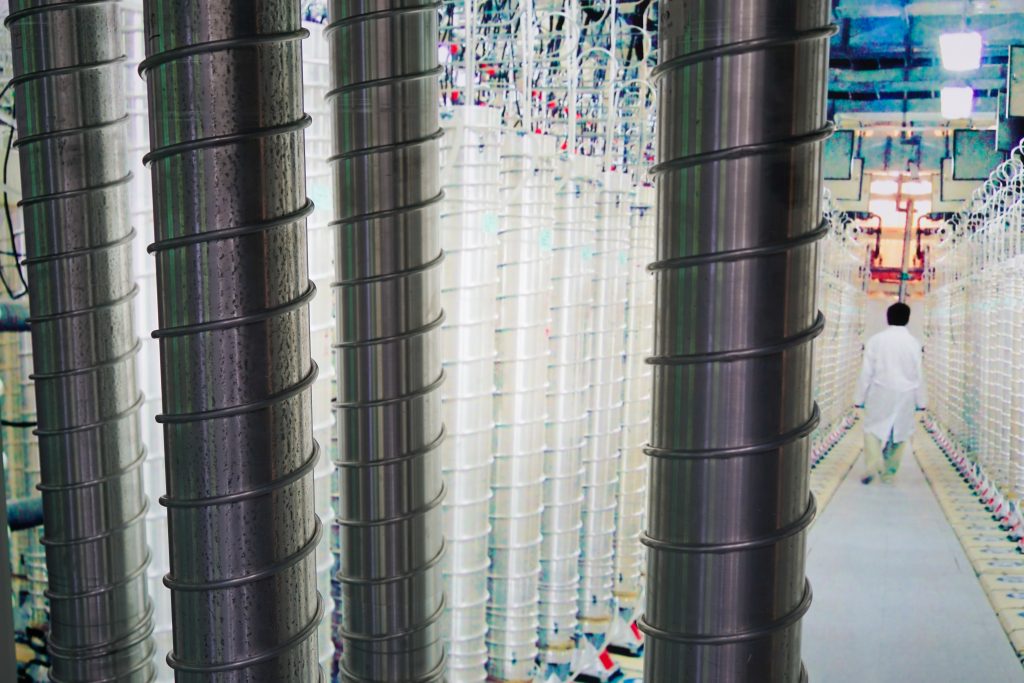IN THE MEDIA
Iran’s hard bargaining looks set to deliver a dangerous deal for international security
February 25, 2022 | Ran Porat

The Strategist | 24 Feb 2022
The eighth round of negotiations to resurrect the 2015 Iran nuclear deal (the Joint Comprehensive Plan of Action, or JCPOA), which resumed in Vienna in mid-February, is looking likely to be the decisive one. It seems all that’s left is approval from Washington and Tehran for an agreement to be reached.
From the beginning, the talks were a clash between completely opposite negotiation styles.
On the US side, President Joe Biden promised to restart diplomacy to ‘strengthen and extend’ the JCPOA. Later, it turned out that American officials were aiming for a limited ‘less for less’ agreement. Now the US’s goals appear to have been downgraded to reaching any deal, at almost any cost, so the administration can close the Iran file and focus on the immense challenges from China and Russia.
On the other side of the table, Tehran has presented tough and uncompromising positions from day one. The Iranians’ negotiating tactics could be described as those of ‘hard bargainers’.
In their book Beyond winning: negotiating to create value in deals and disputes, legal experts Robert Mnookin, Scott Peppet and Andrew Tulumello describe the negotiation techniques used by ‘hard bargainers’.
Typical of such hard bargainers, Iran introduced extreme demands and offered minimal concessions in return. Tehran insisted on immediate removal of most, if not all, sanctions to enable free and unobstructed Iranian oil exports and the swift flow of revenues into the regime’s coffers. Other Iranian preconditions for a deal were a US guarantee not to impose new sanctions or to reimpose previously lifted sanctions and a promise that no future US administration would ever withdraw from a new agreement—both impossible demands for political and legal reasons in the US.
Tehran also chose a slow pace of talks—constantly pausing negotiations and inviting the other parties to lure it back to the negotiating table—in an effort to gradually wear down the Americans and Europeans into bending to Iran’s maximalist demands.
Aware of Biden’s eagerness to quickly reach a deal, Iranian President Ibrahim Raisi taunted Washington by pessimistically stating on 11 February that Iran didn’t ‘pin any hopes on Vienna and New York’.
All the while, the Iranians kept rejecting requests from US officials who were virtually begging them to hold direct talks to seal a deal. Supreme Leader Ayatollah Ali Khamenei in 2018 forbade direct negotiations with the US following President Donald Trump’s decision to withdraw from the JCPOA, and since then the Iranians have been speaking only to European negotiators.
Tehran’s persistently rigid stance reaped success. The Americans were first to cave in, allowing South Korea to use sanctions-frozen Iranian funds to pay Tehran’s debt to the UN. Meanwhile, dialogue between Tehran and Seoul resumed on restarting oil sales from Iran and releasing US$7 billion of Iranian funds held frozen in Korea. Then Washington lifted secondary sanctions on parts of Iran’s nuclear program, allowing non-American companies to redesign nuclear facilities such as the Arak heavy-water reactor and the Fordow enrichment plant, remove nuclear materials such heavy water from Iran, and service the Bushehr nuclear power plant.
Now, judging by leaks from Vienna, a deal is imminent, with the Iranians having achieved most of their stated goals. According to the agreement’s draft, the US will begin gradually removing sanctions within a few days of signing the deal, while Iran will offer mostly reversible token steps in return. A mechanism is being discussed to shield Iran’s economy and nuclear program from possible future reinstatement of sanctions.
Prior to an agreement, a prisoner-swap deal is expected in which Iran would be rewarded with hefty undisclosed sums for its cruel tactic of jailing Westerners on trumped-up charges to be used as hostages.
Tehran reportedly wants an agreement by the Iranian New Year on 20 March. This may sound symbolic, but in fact the timing may be intended to prevent a strong condemnation of Iran when the International Atomic Energy Agency’s board of governors convenes within a few weeks. The IAEA is expected to again publish damning reports about Tehran’s ongoing cat-and-mouse games with UN inspectors.
Reports suggest that, at least initially, Iran would limit uranium enrichment to 5% (above the JCPOA 3.67% cap), but would resume 60% enrichment—very close to military-grade—if it judges that the US is not meeting its expectations regarding the deal.
One thing is certain: much of the progress in Iran’s nuclear program over the past two years—for example, in enriching uranium to military-grade levels and producing uranium metal—is irreversible and a return to the JCPOA framework is impossible.
Iran’s drive towards nuclear-threshold status is not merely a bargaining chip for the Vienna talks; it is the prime target of the regime. Tehran’s actions amount to a slow ‘breakout’ towards the bomb, in an effort to secure the regime’s survival.
A new deal, if reached, would likely leave Iran in a position to amass enough highly enriched fissile material for at least one nuclear bomb within weeks.
A new agreement is also not expected to tackle Iran’s ballistic-missile capabilities or its development of a warhead to carry a nuclear payload over long distance. Nor will it likely address Tehran’s lack of cooperation with the IAEA’s many years’ long investigation into its illegal atomic weapons activities.
Worse, the sanctions would release huge funds to the regime that could be spent on terror operations, subversion across the region and oppression of the Iranian people. It would provide crucially needed oxygen to the failing tyranny in Tehran, ensuring its likely survival for years to come.
Taking all this into account, a ‘no agreement’ option—featuring continuing pressure on, and containment and isolation of, Iran—looks far less damaging than a modified, weaker nuclear deal that would allow Iran to enjoy a huge financial windfall while scoring legitimacy to continue racing towards a nuclear bomb.
Tags: International Security, Iran, JCPOA





